

TIDE Research Group of Interactive and Distributed Technologies for Education. Laspau. Rutherford Learning Group — Developing the Artisan Teacher. EduVenture VR. Evaluation. iTEC classrooom pilots: final evaluation results September 2014 Evaluating the impact of iTEC Learning Activities in schools Over the four years, the evaluators gathered the views of teachers and students (some 1,488 were surveyed), national coordinators and policy-makers through surveys, interviews, focus groups, case studies and observations.
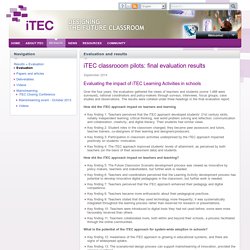
The results were collated under three headings in the final evaluation report. UX Design Courses & Global UX Community. eLearn Center - UOC R&I. HANDSON Radio broadcast from Scotland – Handson ICT. John’s Edutalk Radio Studio – Image Credit: John Johnston, CC BY Every week, Scottish educators; John Johnston and David Noble, broadcast an online radio show; Edutalk in which they talk to people doing interesting things in the world of education, ICT and digital technology.

Last Wednesday John interviewed Ania Rolinska, an English and Technology officer and tutor from University of Glasgow, who helped facilitate the HANDSON MOOC together with Ian Guest, Head of e-learning at an all girls school in Sheffield, England. Ian was a participant in the 3rd Pilot of the MOOC. After providing some background on the history and variety of of MOOCs, Ian shared his personal experience of the HANDSON MOOC. Ania described the HANDSON MOOC and explained its real value for project-based learning in combining a range of structured activities that are underpinned by theory, linked to personal projects selected by the participating teachers. Click on the link below to listen, and/or download the podcast. Formative assessment in the classroom and school. Teachers and schools need to check for learning throughout the school year, not just wait for final examinations.
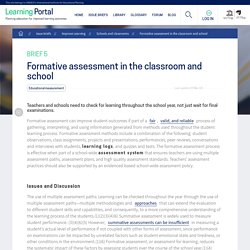
Formative assessment can improve student outcomes if part of a fair, valid, and reliable process of gathering, interpreting, and using information generated from methods used throughout the student learning process. Formative assessment methods include a combination of the following: student observations, class assignments, projects and presentations, performances, peer reviews, conversations and interviews with students, learning logs, and quizzes and tests. The formative assessment process is effective when part of a school-wide assessment system that ensures teachers are using multiple assessment paths, assessment plans, and high quality assessment standards.
Teachers’ assessment practices should also be supported by an evidenced-based school-wide assessment policy. Getting started with Assessment for Learning. Glossary Active learning Learning which engages students and challenges their thinking, using a variety of activities. Assessment for learning Essential teaching strategies during learning to help teachers and students evaluate progress in terms of understanding and skills acquisition, providing guidance and feedback for subsequent teaching and learning.
Closed question A question that can be answered with either a single word (usually ‘yes’ or ‘no’) or a short phrase and the choice of answers is limited. Cold calling Questioning technique in which the teacher selects a learner at random to answer a question, instead of learners putting up their hands to answer a question. Critical thinking The ability, underlying all rational discourse and enquiry, to assess and evaluate analytically particular assertions or concepts in the light of either evidence or wider contexts. Ego-specific feedback Feedback to the learner that focuses on their personal qualities.
Teaching Excellence. What can instructors do to support students?
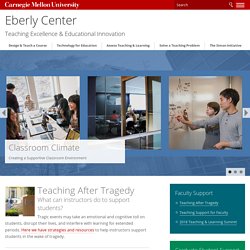
Tragic events may take an emotional and cognitive toll on students, disrupt their lives, and interfere with learning for extended periods. Here we have strategies and resources to help instructors support students in the wake of tragedy. Promoting Academic Integrity Carnegie Mellon has recently revised the university policy on academic integrity. Here we provide you with a pointer to the policy, some considerations and strategies for promoting your students' academic integrity, as well as a few sample policies for you to adapt when developing your own course policies.Visit this resource on academic integrity...
LINK Research Lab – Welcome to Learning Innovation and Networked Knowledge (LINK) Research Lab. NEXT-TELL. Open University Learning Design. Here you will find information about the Open University's approach to Learning Design.
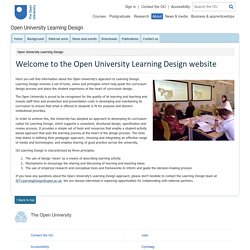
Learning Design involves a set of tools, views and principles which help guide the curriculum design process and place the student experience at the heart of curriculum design. The Open University is proud to be recognised for the quality of its learning and teaching and invests staff time and production and presentation costs in developing and maintaining its curriculum to ensure that what is offered to students is fit for purpose and delivers institutional priorities.
In order to achieve this, the University has adopted an approach to developing its curriculum called OU Learning Design, which supports a consistent, structured design, specification and review process. It provides a simple set of tools and resources that enable a student-activity based approach that puts the learning journey at the heart of the design process.
Learning Analytics and Learning Design. Cuenta de usuario. NEXT-TELL. ICOIE 2017. Dr Eva Tsang Director, Educational Technology and Publishing The Open University of Hong Kong Mobile learning is widely regarded as the next milestone in educational development.
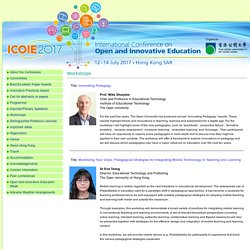
The widespread use of iPads/tablets in education calls for a paradigm shift in pedagogical approaches. It has become a necessity for teaching professionals to be well-equipped with suitable pedagogical strategies for adopting mobile teaching and learning both inside and outside the classroom. CTI ESPOL.
Journals. 21st Century Learning Design (21CLD) 21CLD (21st Century Learning Design) is a professional development program developed by SRI.
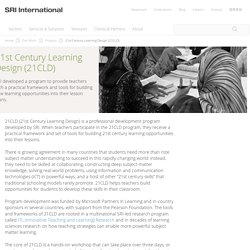
When teachers participate in the 21CLD program, they receive a practical framework and set of tools for building 21st century learning opportunities into their lessons. Dimploadopipe. Centrokappa.com. DANCE Talk Series. In this online talk series, distinguished invited speakers from academia and industry present focus topics related to the DANCE efforts.
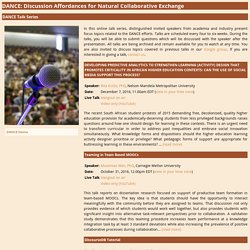
Talks are scheduled every four to six weeks. During the talks, you will be able to submit questions which will be discussed with the speaker after the presentation. All talks are being archived and remain available for you to watch at any time. You are also invited to discuss topics covered in previous talks in our Google group. If you are interested in giving a talk, contact us.
Background Readings – LearnLab. The following readings are recommened before you attend the LearnLab Summer School.
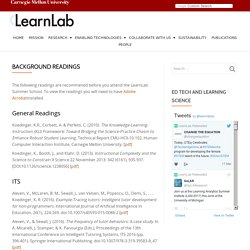
To view the readings you will need to have Adobe Acrobatinstalled. General Readings Koedinger, K.R., Corbett, A. & Perfetti, C. (2010). The Knowledge-Learning-Instruction (KLI) Framework: Toward Bridging the Science-Practice Chasm to Enhance Robust Student Learning. Technical Report CMU-HCII-10-102, Human Computer Interaction Institute, Carnegie Mellon University. Enhancing Education: Home. Institute for Education « Enriching D.C.'s Public Policy Life Making the World's Affairs our Business. Technology Enhanced Learning. Welcome This page has information about how the ADU supports the use of technology to support and enhance learning.
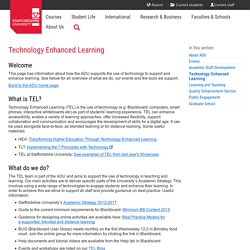
See below for an overview of what we do, our events and the tools we support. Back to the ADU home page What is TEL? Technology Enhanced Learning (TEL) is the use of technology (e.g. What do we do?